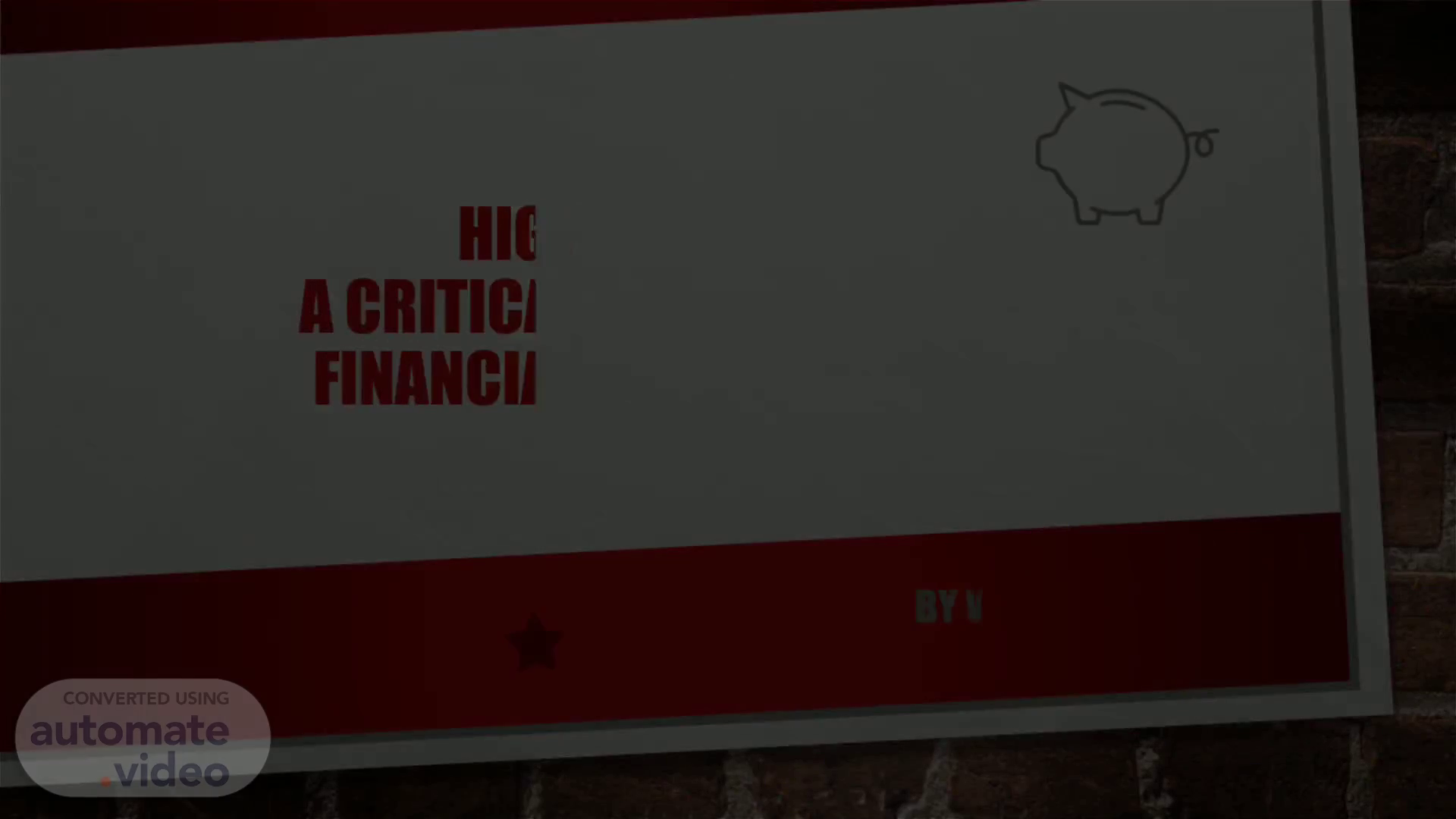
High School: A Critical Time to Teach Financial Independence
Scene 1 (0s)
High School: A Critical Time to Teach Financial Independence.
Scene 2 (4s)
What does it mean to be financially literate? Being financially literate means having the knowledge and skills to manage your personal finances effectively. Financial literacy includes understanding how to budget, save, invest, and manage debt. It also involves having knowledge of financial products and services, such as bank accounts, credit cards, loans, and insurance. A financially literate person knows how to make informed financial decisions and is able to use financial tools and resources to achieve their financial goals. Ultimately, being financially literate means being able to make smart financial choices that improve your financial well-being over time..
Scene 3 (8s)
Why should we teach high school students about financially literacy?.
Scene 4 (14s)
Limited Resources Many schools face limited resources, including time and funding, and some educators may argue that teaching financial literacy takes away from other important subjects. Personal Responsibility Complex Topics Some financial literacy topics, such as investing and tax planning, can be complex and difficult to teach effectively in a high school setting, especially if the teacher does not have a strong background in these areas. Some may argue that financial literacy is ultimately the responsibility of the individual, and it should be up to parents or the individual to learn about finance and money management..
Scene 5 (18s)
Use Relatable Examples Use examples that are relevant and relatable to the economic and social status of the learners. If learners are from low-income families, the examples should be focused on managing limited income and resources. Emphasize Different Financial Goals People from different economic and social backgrounds may have different financial goals. Someone from a low-income family may focus on managing debt and basic expenses while someone from a higher income family may focus on building wealth and investing. Address Barriers to Financial Literacy People from different economic and social backgrounds face different barriers to financial literacy, such as lack of access to financial institutions, language barriers, or cultural factors. Financial literacy lessons should address these barriers and provide resources to help learners overcome them. Provide D ifferent R esources People from different economic and social backgrounds may have different financial resources available to them. Lessons should provide information on alternative financial services like credit unions or community development financial institutions. Acknowledge D ifferent F inancial E xperiences People from different economic and social backgrounds may have different financial experiences and perspectives. Financial literacy lessons should acknowledge these differences and create a safe space for learners to share their experiences and ask questions..
Scene 6 (22s)
Paulo Freire was an influential philosopher of education in the twentieth century. His aim was to help oppressed populations and eradicate illiteracy. Freire criticized the banking model of education because of the way teachers ‘deposit’ information to their students by saying that teachers acted like bank clerks rather than facilitating learning. Freire believed that true learning comes from conversation, questioning, and the sharing of knowledge between teachers and students..
Scene 7 (26s)
Overall, while there are some arguments against teaching financial literacy in high school, the benefits of financial literacy education outweigh the drawbacks, particularly as it can help students make informed financial decisions and reduce financial stress in the long run. Modifying financial literacy lessons based on economic and social status can help to make the lessons more relevant and effective for learners and ensure that they have the tools and resources they need to achieve their financial goals..
Scene 8 (30s)
Resources Benefits of financial education in Schools. NFEC. (2023, March 28). Retrieved April 21, 2023, from https://www.financialeducatorscouncil.org/benefits-of-financial-education-in-. Camberato , J. (2022, October 12). Council post: Should schools teach financial literacy classes? Forbes. Retrieved April 21, 2023, from https://www.forbes.com/sites/forbesfinance council/2022/10/11/should-schools-teach-financial-literacy-classes/? sh =627701804633. Micheletti , G. (2010, February 1). Re-envisioning Paulo Freire's "banking concept of Education". Inquiries Journal. Retrieved May 1, 2023, from http://www.inquiriesjournal.com/articles/171/re-envisioning-paulo-freires-banking-concept-of-education. Ramsey Solutions. (2023, January 11). Should financial literacy be taught in more schools? Ramsey Solutions. Retrieved April 21, 2023, from https://www.ramseysolutions.com/ financial-literacy/should-financial-literacy-be-taught-in-schools#:~:text=Financial% 20literacy%20classes%20teach%20students,lead%20to%20lifelong%20money% 20struggles. Roberts, Sherry. (n.d.). Why we should teach personal finance in high schools. Pearson. Retrieved April 21, 2023, from https://www.pearson.com/ped-blogs/blogs/2022/10/why-we-should-teach-personal-finance-in-high-schools.html. Taylor, E.W., Tisdell , E.J. and Forté , K.S. (2012), Teaching financial literacy: a survey of community-based educators. International Journal of Consumer Studies, 36: 531-538. https://doi.org/10.1111/j.1470-6431.2012.01105.x. Xiao, J.J., Chatterjee, S. and Kim, J. (2014), Financial independence of young adults . International Journal of Consumer Studies, 38: 394-403. https://doi.org/10.1111/ijcs.12106..